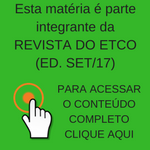Professor, what is ethics for?
ETCO project seeks to awaken reflection on the theme in schools across the country. First partnership was signed in the São Paulo Department of Education
 One of ETCO's main initiatives in 2017 is the project Youth Ethics, which seeks to unite the Institute with school networks, especially public ones, to stimulate reflections on ethical behavior among students. The program was launched on June 19, at an event at the São Paulo State Department of Education, with whom ETCO signed the first partnership to take it to schools. And it had the support of the São Paulo State Ombudsman and the São Paulo Public Administration Transparency Council.
One of ETCO's main initiatives in 2017 is the project Youth Ethics, which seeks to unite the Institute with school networks, especially public ones, to stimulate reflections on ethical behavior among students. The program was launched on June 19, at an event at the São Paulo State Department of Education, with whom ETCO signed the first partnership to take it to schools. And it had the support of the São Paulo State Ombudsman and the São Paulo Public Administration Transparency Council.
The main focus of the project is teachers and students from high school or from the last years of elementary school - which, in the state public system of São Paulo alone, represents more than 2 million students. The objective is simple: to propose to teachers and students to dedicate some classes to activities that stimulate critical thinking and awareness of the importance of ethics in society. To this end, ETCO carried out studies to define the best way to impact young people, hired specialists to prepare support material for teachers and is investing in the search for new partnerships such as the one established in São Paulo and in the dissemination of the project, to generate the adhesion of teachers and expand their reach.
ETCO's executive president, Edson Vismona, says that the project fulfills a responsibility that was attributed to him by the Institute's Board of Directors in 2016, when he was chosen for the position. “I was asked to, in addition to continuing to defend competitive ethics, reinforce one of the fundamentals of ETCO, which is the defense of ethics in broader terms. In this sense, we chose young people as our target audience: after all, there is no way to transform Brazil's ethical standards without paying special attention to the formation of new generations ”, explains Vismona.
MAIN GOALS
Based on work with young people, the project seeks to take the debate on the importance of ethics to the whole of society. The first step was to understand what this audience thinks about the topic. To this end, the Institute hired a survey by Datafolha, which brought several valuable insights. He found, for example, that young people are aware that the problem of lack of ethics is not restricted to "others", but also affects their closest circles. The worst score is given to others: 90% consider “society” to be little or not ethical and 74% judge the same thing in relation to friends. But the assessment of their own family and of themselves is also mostly negative: 57% in both cases. The research also pointed out that teachers are an important ethical reference for young people. They received the second best score in this regard, behind the firefighters only. Another important revelation was the opinion of young people about what kind of action can have the most impact in changing the ethical standard of Brazilians and in building a more honest society. Among several possibilities, the most suitable was the proposal to stimulate more conversations and debates on the theme, whether at home, with the family, or in contact with friends - which includes the school. “The Datafolha survey consolidated our belief,” says Vismona. “We concluded that ETCO could generate a multiplier effect by engaging educators, who are seen as one of the greatest ethical references for young people, in the initiative to include or expand the discussion of this topic with their students.”
Click here and access the full survey on the Ethics for Youth website
STOLE OR SAVED A LIFE?
The next step was to create material that could assist teachers in this task. ETCO hired a specialized team to produce and make available on the internet a set of suggestions for ethics activities for the classroom. This work involved a series of precautions, starting with the determination not to create a “moral lessons” guide, as the consultant Denise Hirao, responsible for preparing the material, says. “We did not intend to 'teach' what is or is not ethical. We create activities with the aim of provoking reflection among young people about how they formulate their own ethical parameters and the reasons why they obey them or not ”, she explains. Another concern was to create interesting lesson proposals for young people based on the most current pedagogical recommendations. In this sense, we sought to bring the theme closer to the students' reality and to use modern resources such as cartoons and plots that promote student participation and interaction between them. In one of the activities, for example, young people are divided into different groups to judge the action of a civil servant who diverted a medication from a health center to save the life of a neighbor. In another, they face the dilemma between stopping buying textbooks for all students or turning to salespeople who charge much lower prices, but adopt criminal practices. Themes such as corruption, bullying and human rights are also present in the material.
The challenge for the coming months is to expand the scope of the project. At the São Paulo Department of Education, the project has broad support. The state secretary, Renato Nalini, signed a partnership with ETCO foreseeing several initiatives to spread the activities in schools in São Paulo. “Stimulating reflections on ethics among young people is an extremely important mission”, evaluates Nalini.
The first event of this partnership occurred together with the launch of the project: a debate on ethics in the school that brought together names such as the Assistant Secretary of Education, Francisco José Carbonari, the São Paulo State Ombudsman, Gustavo Ungaro, and educators Eunice Prudente and Adriano Marangoni, in addition to the ETCO president.
The launch of the project and the results of the survey carried out by Datafolha were disseminated by several media outlets, helping to expand its impact and attract the interest of other educational bodies.
The expectation is that new partnerships will be closed in the second half and that the initiative will be disseminated throughout the country.
FOR TEACHERS AND STUDENTS
The activities that ETCO created to stimulate the debate on ethics in the classroom are available on the website www.eticaparajovens.com.br





